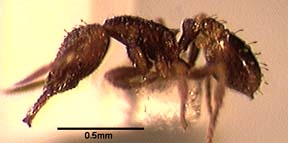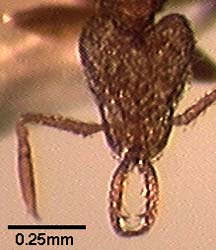
Specimen: Costa Rica, Prov. Heredia: La Selva (J. Longino 3203-s). INBIOCRI001237677. Image by J. Longino.

Specimen: Costa Rica, Prov. Heredia: La Selva (J. Longino 3203-s). INBIOCRI001237677. Image by J. Longino.
This manuscript name is a conditional proposal by B. Bolton (sensu Article 15 of the 1985 ICZN), and thus not made available here. Its appearance here or in any duplication of this page does not constitute publication (sensu Article 8 of the 1985 ICZN).
Dacetini, Myrmicinae, Formicidae, Hymenoptera, Insecta, Arthropoda, Animalia
John T. Longino, The Evergreen State College, Olympia WA 98505 USA. longinoj@evergreen.edu
17 August 1997
Specimen: Costa Rica, Prov. Heredia: La Selva (J. Longino 3203-s). INBIOCRI001237677. Image by J. Longino. |
Specimen: Costa Rica, Prov. Heredia: La Selva (J. Longino 3203-s). INBIOCRI001237677. Image by J. Longino. |
Identification
Mandible somewhat bowed; apical fork of mandible without intercalary tooth; mandible with long, spiniform preapical tooth about one quarter distance from apical fork to mandible base; minute denticle variably present one half to two thirds distance to mandible base; eye composed of 1-4 facets; gaster smooth with strong basal costulae; gaster with erect setae distinctly spatulate.
Head width 0.38mm, head length 0.47, mandible length 0.25, CI 81, MI 53 (n=1 specimen from La Selva Biological Station, Costa Rica).
Range
Costa Rica (Atlantic lowlands).
Natural History
Brown and Wilson (1959) summarize the genus as follows:
"Widespread in tropics and warm temperate areas. Primarily forest-dwelling; some species occur in grassland and arid scrub. ... Nests mostly in soil and rotting wood; a few species live in arboreal plant cavities in tropical rain forest. Foraging hypogaeic to epigaeic-arboreal. Food: most species are collembolan feeders; a few are polyphagous predators or occasionally feed on sugary substances..."
This species occurs in lowland wet forest, in leaf litter on the forest floor.
Selected Records
Winkler and/or Berlese samples from La Selva, Braulio Carrillo National Park at 300m.
Literature Cited
Brown, W. L., Jr., Wilson, E. O. 1959. The evolution of the dacetine ants. Quarterly Review of Biology 34:278-294.